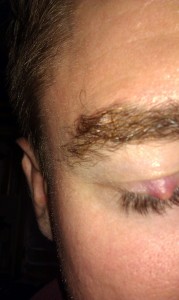After receiving the news that I have an autoimmune disease called Hashimoto’s Thyroiditis I was in a bit of a daze, as I didn’t know anything about the condition. All the typical questions were going through my mind: Why did I get Hashimoto’s? What causes Hashimoto’s? How can I treat Hashimoto’s? Can Hashimoto’s be cured?
While I waited to see the endocrinologist I tried using my phone to google for information, but the phone reception at Mt. Elizabeth Hospital in Singapore is terrible and I could hardly load a page or two before I was called in to see the specialist. Now I was going to get some answers!
The doctor, who was pleasant enough, then started to tell me the bad news. They don’t really know what causes Hashimoto’s, but there seems to be a genetic disposition to it. Hashimoto’s tends to be more common in women, especially those over 50, so I was rare male case. All that he could offer is to monitor my thyroid stimulating hormone (TSH) and Free T4 levels to determine the correct dosage of T4 (Euthyrox in my case). There is no cure and I would have to take the pill every day, for the rest of my life.
Unfortunately, this is where I started to learn the hard lesson that for chronic diseases, such as diabetes, Hashimoto’s, and arthritis, western medicine doesn’t have a good answer, other than: “here, have a pill.” I’ll do a dedicated post on this problem at a later date, but suffice to say, I was quite frustrated after leaving the specialist.
I contacted my family to find out that my mum has hypothyroidism, but was never tested to see if the cause was Hashimoto’s. Given the genetic component, I’m guessing she probably has Hashimoto’s and I was predisposed to getting it from her wonderful genes. Thanks mum! 😉
I was determined to educate myself on this disease and find out if there were any different opinions on Hashimoto’s.
Anyone who has used the internet to research health conditions will have undoubtedly encountered the same problem that I then did. There is just so much information and plenty of it is written by people who make sweeping statements about a particular condition based on their own experience. Known in the scientific jargon as N=1 studies (a sample size of one), thus their opinion is hardly a great indication of validity. There is also the complication that Hashimoto’s and hypothyroidism tend to get lumped together which can cause confusion and poor recommendations. Finally, most of the information is more focused on women with Hashimoto’s than with men with Hashimoto’s.
After a lot of reading articles and watching too many Youtube videos, the best cause of action seemed to be to fix my diet to remove all possible food related triggers that cause possible immune system responses. A paleo diet came up as one of the best options. Can you imagine how I felt when I read that? Here I was trying to make a positive lifestyle change and had already chosen a paleo based diet. Then I find out that it is the best diet for a condition that I didn’t even know I had when I made that choice!
Once the diet is started I needed to get the medication working to bring my TSH, T4 and T3 levels under control. After that there was not much that I could find on people who had actually managed to come off their medication and keep the disease at bay.
Given that sorting out the medication would take quite some time (months), I decided to dive into the paleo and primal world to learn as much as I could about my choice of lifestyle change. Then when I had my medication sorted I would return to focusing on how to possibly cure or at least control my Hashimoto’s.
For those that are interested here are my first test results for the Hashimoto’s indicators:
T4 Free 10.37 (10.00 - 23.00 pmol/L) 0.81 (0.78 - 1.79 ng/dL) TSH 11.873 (0.450 - 4.500 mlU/L) Tg Ab 122.40 (0.00 - 4.10 IU/mL) TPO Ab 1300.32 (0.00 - 5.60 IU/mL)
There was no T3 test performed, as at the time of testing there was no known condition, thus it was unnecessary. The antibody tests were performed on the same blood sample to confirm Hashimoto’s, but only ordered after the doctor saw my TSH result.
In my next post I’ll go into more detail on the research I did during this time, including Youtube videos to watch, websites to visit and other, useful bits of information.

